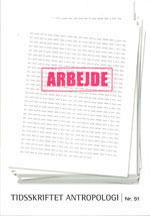HAVEARBEJDE: Moralsk praksis i en sydafrikansk storby
DOI:
https://doi.org/10.7146/ta.v0i51.106703Resumé
Ten years after democratization, the township areas surrounding South African cities
are still dominated by poverty and unemployment. For most township inhabitants,
wage employment is not an option, and they engage in numerous activities to provide
their families with the daily bread. One of these activities is the cultivation of vegetables
in community gardens. In Port Elizabeth, community garden projects have received
support from a number of development institutions working in the townships.
Development institutions and township inhabitants alike regard cultivation as not just
a matter of putting food on the table, but also an activity with significant moral
connotations. To the township inhabitants, the moral person is a person who
continuously participates in social networks through everyday exchanges with family
and neighbours, and ritual exchanges with their forefathers. Cultivation of the soil
provides cultivators with crops for those exchanges and creates a feeling of being close
to the forefathers. Furthermore, cultivators underline that morality becomes embodied
through hard work, which teaches people good social behaviour. Development
institutions, on the other hand, see the moral person as an autonomous individual who
works hard to sustain his family and develop and thus proves himself as a good citizen.
While development institutions expect cultivators to concentrate their efforts on making
the gardens productive and sustainable projects, the cultivators use cultivation as an
investment in social relations and focus on the sustainability of their life as such. In
this way, cultivators’ practice is also a way of reworking and reinterpreting the meaning
of a development intervention to fit a local moral world.
Downloads
Publiceret
Citation/Eksport
Nummer
Sektion
Licens
Ophavsretten til artiklerne i Tidsskriftet Antropologi tilfalder forfatteren.
Artikler publiceret i Tidsskriftet Antropologi må citeres, downloades og videresendes for ikke-kommerciel brug, under forudsætning af normal akademisk reference til forfatter(e) samt tidsskrift, årgang, nummer og sider. Artiklerne må kun genudgives med eksplicit tilladelse fra forfatter(e) og tidsskriftet.


